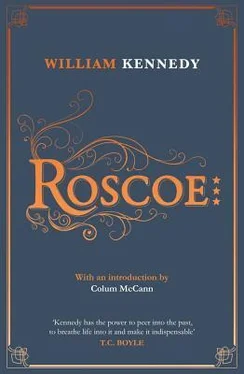“What?”
“Cleaning up the town. Give the whores a vacation till after election, and padlock the whorehouses.”
“Didn’t the whorehouses close after the raid?”
“Does a whore ever really close her legs?”
“What about the Governor padlocking the Notchery? It looks like we’re taking dictation from him and Jay Farley.”
“Politically motivated is our line on the Notchery and on Farley’s view of it. We can’t let the Republicans take the moral high ground. We must protect our soldier boys and young people against goatish lust and illicit smut. We raid the after-hours strip clubs, Mother’s, the Blue Jay Bar, we nail Broadway Books for pushing pornographers like Henry Miller, Baudelaire, Rimbaud, and those dirty Cuban comic books, then we sweep the newsstands and confiscate every girlie magazine that shows more titty than is absolutely necessary in a virtuous society.”
“That’s a freedom-of-speech issue. How do we get away with it?”
“We don’t indict anybody, and after the election things go back to normal. Meantime, it takes people’s minds off Jay Farley.”
“I saw Patsy this morning and he didn’t mention you had this in mind,” Alex said.
“He hasn’t heard it yet. I just invented the idea.”
“Well, then, fine, fine,” Alex said with a smile, “very fine. How will Bindy take it?”
“Bindy can’t object. He’s got a consorting charge hanging over him. We’ll organize it all with Burkey and Donnelly.” Melvin Burke had been named acting police chief after O.B.’s death, and District Attorney Phil Donnelly would prosecute. “We’ll make the raids tomorrow afternoon, in time for you to talk about it on the radio.”
“Sex on the radio?”
“It’s an idea whose time has come. We’ll call it something else.”
“Shouldn’t we let Patsy know the plan?”
“He’ll be thrilled. We’ll tell him after we take our walk.”
They left City Hall and walked along Eagle Street, past the Court of Appeals and the County Courthouse and up Elk Street with its old townhouses, once the city’s elite Quality Row, sometimes compared in elegance to Gramercy Park. The Governor’s Mansion had been at number 13 Elk in the last century. Now the whole street was aging with scant grace, two nightclubs on the block and one handsome building defaced with a kitschy black-and-white Art Deco façade. What would Henry James say?
On the street Alex revealed Patsy’s news. The state Party leaders were thinking Alex might make a good run for governor in 1946: a decorated combat veteran with a Yale degree, an upstater who could speak well and think on his feet, a good-looking young fellow with a million-dollar smile. What else do you want in a governor? Well, will he get any votes? Oh, he will. And now Patsy has another reason to escalate this year’s totals: shove these numbers up your nose, Governor, and look how they love our boy Alex.
“I know Patsy would like a landslide,” Roscoe said. “I have it on our agenda. How do you feel about a run for governor?”
“I think I like it. Shouldn’t I?”
“Don’t get used to it. They don’t nominate upstaters. But we can try again to be the exception. You remember 1932?”
“I’ve been thinking about it all morning.”
“Six more delegates, your father might’ve been governor.”
“Maybe history will repeat.”
“And maybe they’d offer you lieutenant governor.”
“I wouldn’t take it.”
“Don’t say that. You can’t know where it might lead. Your father took it out of duty. He never even wanted to be governor. If he’d really fought for it in his heart, he might’ve got it. And he’d have been a memorable governor. He did as well with the number-two job as anybody ever does.”
Roscoe was feeling something new in his throat, a rising gorge that might choke him, resistance to doing this thing again. He couldn’t put Alex through it, couldn’t watch it; the incumbent would be very tough to unseat next year. Food for powder, Alex, food for powder. They walked across the park behind the old Albany Academy toward the Capitol, and Roscoe felt the long line of governors hovering over their lives: Cleveland at the top of the Capitol steps watching the torchlight parade (Lyman his grand marshal) coming up State Street, lighting his road to the White House in triumph over a paternity scandal: “Ma, Ma, where’s Pa?”; and Teddy Roosevelt racing a newspaperman up the Capitol’s seventy-seven front steps, ready to give an exclusive interview if he loses, which he won’t, for the press is the enemy; and our old pal Al Smith in wing collar and cutaway, standing for his 1928 portrait of a presidential loser; and FDR entering the Executive Chamber, held at the armpit by an aide, rotating his dead legs in braces in a simulated walk to the desk where he will sit in judgment on Jimmy Walker, the trial that will destroy Tammany; our delightful incumbent Governor trying now to do the same to the Albany Democrats; and, of course, Governor Elisha Fitzgibbon delivering his State of the State message to a joint session of the legislature: “My fellow New Yorkers — I wonder do you kitty? Do you cut pips?”
These images were neither nostalgic nor cautionary, but Roscoe thought they might be trying to reveal that everything familiar was illusory and to be avoided, and that only the mysteries in Eli’s double-talk and ambiguous death were worth pursuing: Eli feeding Roscoe ammunition for the battle against oblivion. This is not the end, Eli was saying. An imaginative man will find a way around the impossible. After all, Roscoe, you are now the courtroom hero, the inventor of yesterday and tomorrow, the Prophet of Fraudulence, and what obstruction could possibly stand in your way?
They stood in the shadow of the Capitol, the fortress of the enemy. Roscoe could not foresee when the Party would again have an ally in the Executive Chamber. It depressed him to think of waging futile battles to win it back. When should an old soldier call it a day? Shouldn’t you quit a winner, Ros? And so he told Alex about Gilby’s court case.
“You actually used the word ‘rape’?”
“Better than ‘incest,’” Roscoe said. “This way it’s an instant of sexual wildness, not a family vice.”
Alex tightened his face, his eyes narrowed, his lips flattened. His resemblance to Gilby was as obvious as his anger.
“You had no right to talk of rape,” Alex said. “You should’ve checked with me. Goddamn it, Roscoe, this disgraces my father, makes him an animal. And it humiliates me. God knows what it might do to Gilby.”
“It was a distraction for Pamela’s lawyer. The blood test destroyed their case, and our threat of prosecution guarantees she won’t come back.”
“It was lousy. It stinks.”
“Try to remember why your father killed himself.”
“I’ve never understood it.”
“He did it for the family.”
“You say that, but I never bought it.”
“He did it for the Party, for you.”
“For me?”
“The scandal could’ve erupted in the middle of your campaign. But he eliminated that possibility by eliminating himself.”
“You’re reading too much into it.”
“I think not. He not only got rid of her blackmail, he proclaimed himself Gilby’s father. He knew his blood was the same as Gilby’s — type AB. We found his blood test with papers he left on his desk before he killed himself. Why leave a blood test there that night? His last chance to let us know about the paternity, to admit it to anybody who could read. He knew what the church and the public would say about it and he didn’t want anyone else blamed.”
Alex said nothing. He had probably not known his father’s blood type. Why would he? Roscoe hadn’t known it either. Elisha hadn’t left any blood test with his papers. Roscoe created the test for the court hearing, also created AB as Elisha’s type because of its compatibility with Gilby. And Alex.
Читать дальше












